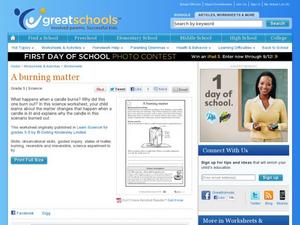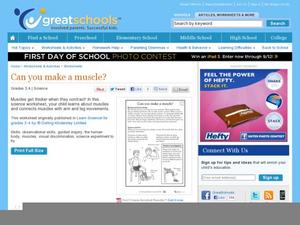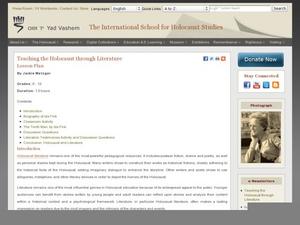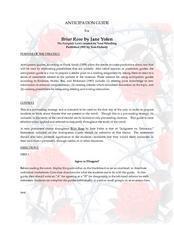Curated OER
Contractions
Shorten words with contractions. Second graders use apostrophes to shorten words, including harder ones like might not. Next, they write out the longer versions of various contractions. Have them write a story with these contractions for...
Curated OER
Days of the Week
Cover both capitalization and the days of the week with a great kindergarten activity! Kids read each day of the week out loud, then write the name of the day on a line. They answer three questions about certain days of the week,...
Curated OER
Poems: calligrams
Have fun with shape poems! First and second graders write calligrams that add to the meaning of their poems. Great for your poetry unit or if you want to combine poetry and art lessons.
Curated OER
Question words, question marks
Practice the five W's and question marks with a fun grammar worksheet. After copying the words who, what, where, when, why, and how, kindergartners fill the words into various questions. For extra practice, have kids come up with their...
DK Publishing
A Burning Matter
The process of fire requires oxygen, heat, and fuel. Take one of those away, and fire ceases to exist. That's the idea behind this learning exercise which portrays a candle burning inside an upside down jar. Pupils answer a couple of...
Curated OER
All About Seeds!
How do fruits relate to flowers and seeds? Identify the seeds and their purpose with a coloring activity for kindergartners. Once they color the seeds of apples, bananas, and peas (among others), kids get hands-on experience with bean...
Curated OER
Bones Provide Great Support!
How do bones help people move around? A science investigation prompts kids to draw arrows to certain bones that protect their organs. After they finish, they trace their hands on a piece of paper and trace the way their bones go. Great...
Curated OER
Can You Make a Muscle?
Why are muscles important? Third graders study the different kinds and functions of muscles in the human body. After drawing arrows in an illustration to indicate where a muscle contraction would occur, they do their own experiment about...
Curated OER
Teaching the Holocaust through Literature
Centered on the short story "The Tenth Man" by Polish Holocaust survivor Ida Fink, here is a solid one-day resource to support study of World War II or Nazi history, short stories, or to complement any ELA unit on The Diary of Anne Frank...
For the Teachers
Story Strips Sequencing
What happens next? Work on story sequence with a instructional activity that prompts kids to put a story back in order. Additionally, they discuss what would happen if one event was missing from the sequence.
Indiana University
World Literature: "One Evening in the Rainy Season" Shi Zhecun
Did you know that modern Chinese literature “grew from the psychoanalytical theory of Sigmund Freud”? Designed for a world literature class, seniors are introduced to “One Evening in the Rainy Season,” Shi Zhecun’s stream of...
Curated OER
World Literature: “The Wounded” By Lu Xinhua
“The Wounded,” the title story from a collection of stories about the Chinese Cultural Revolution (1977-78), is the central text in a World Literature unit examining choices. An anticipation guide, discussion topics, vocabulary list,...
Curated OER
APA and MLA Formats: Their Main Differences
What is the difference between MLA and APA format? This presentation is geared towards a college audience, but it could definitely be useful with an eleventh and twelfth grade audience in high school. Differences are highlighted, but not...
Curated OER
APA Format and Citation
What is APA format, and how is it different from MLA format? Dive into the world of APA, investigate how to properly cite resources in-text, and look at a reference list of sources. Intended for higher education, not all of the...
Curated OER
Briar Rose: Anticipation Guide
Prepare your readers for Briar Rose with an Anticipation Guide that asks them to agree or disagree with a series of statements that reflect issues raised by Jane Yolen’s narrative about a young girl’s research into her grandmother’s...
Curated OER
KWHL Questioning Strategy for Briar Rose
Whether new to the KWHL strategy or not readers of Briar Rose will benefit from the detailed procedures and templates designed for Jane Yolen’s novel. Links are provided for research into the Holocaust and activities reveal the many...
Curated OER
Unsent Letter: Characterization in Briar Rose
After completing Jane Yolen’s Briar Rose, class members assume the voice of Gemma and craft a personal letter to her granddaughter telling Becca how she feels about Becca’s actions and the discoveries at Chelmno. Complete directions for...
Curated OER
The Call of the Wild: 4 Corners Activity
Readers of The Call of the Wild engage in a four- corners activity that fosters discussion and encourages readers to make connections between their lives and the text. Individuals respond to a series of discussion prompts and justify...
Curated OER
El tiempo presente de los verbos -er and -ir
Did you know that -ir and -er verbs in the present tense are conjugated almost the same? They only differ in the nosotros and vosotros forms. Review the chart at the top of the page before diving into the rest of the resource! Learners...
Curated OER
Maus: After Reading Strategy Instructional Routine
Class members create literary mandalas for two characters from Maus, Art Spiegelman’s graphic novel about his father’s experiences with the Holocaust. After finding quotes that reveal three good traits and three bad traits of each...
Curated OER
Vocabulary Strategy Instructional Routine: Maus I and II
Pogrom, schlepped, meshuga. Kapo, reich, Wehrmacht. As part of a unit study of Maus I and II, readers use a list-group-label (LGL) strategy for vocabulary drawn from Art Spiegelman's famous graphic novels. The focus of the activity is...
Curated OER
Pre-Reading Strategy Instructional Routine: Maus I and II
Vladek's attitudes are difficult for many young learners to understand. Prepare your class for the events represented in Art Speigelman's graphic novel with a pre-reading activity that has them read articles about and interviews with...
Curated OER
Mississippi Trial, 1955: K-W-H-L Strategy
To prepare for a reading of Christopher E. Crowe's Mississippi Trial, 1955, class members create a KWHL chart and begin by generating questions they have about the civil rights movement, slavery, and the death of Emmett Till.
Curated OER
The Adventures of Huckleberry Finn: Socratic Seminar
After reading The Adventures of Huckleberry Finn and an article about the use of the novel, class members engage in a Socratic seminar focused on whether or not Twain's book should be banned.
Other popular searches
- Microsoft Publisher
- Teaching Microsoft Publisher
- Ms Publisher 2003
- Microsoft Publisher 2007
- Ms Publisher
- Microsoft Publisher Projects
- Publisher 2002
- Microsoft Publisher 2002
- Publisher Projects
- Microsoft Publisher Lessons
- Publisher Business Cards
- Publisher Lesson Plans

























